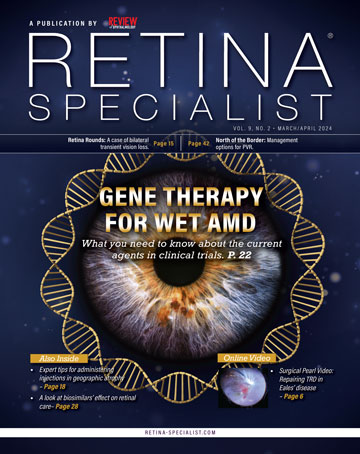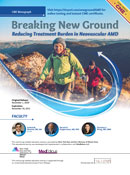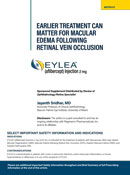The question, “Can I bill for that service during the 90day global period?” comes up periodically from clients. Often, the question is prompted because the patient requires services outside the typical postoperative care. That might include additional office visits and diagnostic tests. Some cases may require additional procedures, including intravitreal injections.
Medicare instituted a global surgery policy in 1992 as part of physician payment reform. Under this policy, Medicare pays a single fee for all necessary services normally furnished by the surgeon before, during and after the procedure. The policy describes services included in the national definition of “global surgery,” as well as the services that are excluded and paid separately.
This article reviews the types of services included and excluded from the global payment for surgical procedures and provides examples of some of the more common areas of confusion.
Global Services Included
The Medicare Claims Processing Manual (MCPM) outlines the services included in and excluded from the global services package.1 Major surgeries are defined as those procedures that have 90-day postoperative periods. The Medicare-approved amount for these procedures includes payment for the following services related to the surgery:
• Preoperative visits after the decision is made to operate, beginning with the day before surgery.
• Intraoperative services usual and necessary to the surgical procedure.
• Additional medical or surgical services required of the surgeon during the postoperative period to treat a complication, but that do not require a return to the operating room.
• Follow-up visits during the postoperative period related to recovery.
• Most surgical supplies (such as some injectable medications) unless identified as exclusions.
Global Services Excluded
Those services excluded from the global surgical package and reimbursed separately include:
The initial evaluation by the surgeon to determine the need for surgery. If this service is provided during the global period, append the appropriate modifier to the office visit code to secure reimbursement. Services of other physicians (outside of a group practice), unless this is a shared-care surgery involving a transfer of care.
Visits unrelated to the diagnosis for which the surgical procedure is performed. Modifier 24 identifies these visits as unrelated.
Clearly distinct surgical procedures that are not reoperations or treatments for complications.
Diagnostic tests.
Treatments for postoperative complications that require a return trip to the operating
room.
• Unplanned, medically neces-
sary return trips to the OR for any reason and without regard to fault are separately reimbursed, but at a reduced rate. Under the modifier 78 rules, the payment for reoperations is the value of the intraoperative service for the CPT code. The postoperative clock does not restart from the date of the procedure.
• If a less-extensive procedure fails, and a more extensive procedure is required, the second procedure is payable separately.
Diagnostic Tests
The most frequent question we are asked is associated with diagnostic testing. The MCPM states that diagnostic tests are not part of the global surgical payment. When medically necessary, diagnostic testing is reimbursed during the postoperative period, no modifiers are required to facilitate payment.
The test needs to provide diagnostic value. For example, a physician documents postoperatively that a recent retinal-detachment surgery was successful and the retina is now flat. The surgeon draws the successful retinal-detachment repair and submits a claim for extended ophthalmoscopy (EO) (CPT 92226). Performing a test to document a successful outcome is not likely medically necessary.
National Government Services, a Medicare administrative contractor for several states, published the local coverage determination L33567, Ophthalmology: Posterior Segment Imaging (Extended Ophthalmoscopy and Fundus Photography), which addresses billing an EO during the postoperative global period. It states:2
Extended ophthalmoscopy (codes 92225, 92226) performed during the global surgery period of an ophthalmologic surgery procedure, by the same provider performing the surgery, will not be separately payable unless unrelated to the condition for which the surgery was performed.
Extended ophthalmoscopy is a physician service (examination of the eye) commonly occurring during the global postoperative period of ophthalmic surgery. As a physician service, it is included in the aftercare of the patient and is not separately billable.
In contrast, if a vitrectomy to treat an unresolved vitreous hemorrhage from diabetic retinopathy is followed by an optical coherence tomography scan during the postoperative period to evaluate residual macular edema, the test is likely medically necessary.
In-office Procedures
An intravitreal injection is sometimes reimbursed during the global period. The reason for the injection is the key question to consider. For example, an injection in the exam lane to treat residual edema following an inner limiting membrane peel would be considered postoperative care. The injection is to treat a problem related to the ILM peel. Unless the injection was preplanned (staged) before the ILM peel, the procedure is not billable; the drug, however, is.
Group Practice Issues
In a multispecialty ophthalmic practice, sometimes the retina specialist is asked to address a complication from another surgeon. For example, six weeks following cataract surgery, your partner, Dr. Cataract, sends you a patient to evaluate for possible cystoid macular edema. Following an evaluation, OCT and an angiogram, you confirm CME in the operative eye. Unfortunately, since you and Dr. Cataract are partners in the same practice, the visit is postoperative care for a complication from the cataract surgery.
The MCPM includes a reference for physicians in group practice.3 It states: When different physicians in a group practice participate in the care of the patient, the group bills for the entire global package if the physicians reassign benefits to the group. The physician who performs the surgery is shown as the performing physician.
Physicians of the same specialty in a group practice function collectively as the “surgeon” and should abide by the global surgery rules. In this context, an associate is not distinguished from the performing physician and inherits the limitations the global surgery policy imposes.
The office visit to evaluate a complication of cataract surgery by your partner is part of the global payment. Do not append modifier 24, calling this an unrelated office visit. The tests, which are not part of the global package, are separately reimbursed. As mentioned, injections in the exam lane to treat CME are postoperative care, but the drug is reimbursed.
Conclusion
Knowing which items and services are included in or excluded from the global package can be confusing. When deciding if a service is related to the surgery and, therefore, part of the postoperative care, consider whether the problem being addressed may have occurred regardless of the surgery. For instance, two months following an uncomplicated ILM peel, the patient has a retinal detachment in the same eye. Could the RD have occurred regardless of the ILM peel? If you answer a definitive “yes,” then this is not likely a postoperative complication and the services to evaluate and treat the RD are likely unrelated to the ILM peel. Therefore, they are separately reimbursed.
For more information on reimbursement for surgical procedures during the postoperative period, see “Avoiding Post-Surgical Modifier Confusion” (September 2017).4
Mr. Mack is a senior consultant with Corcoran Consulting Group. He can be reached at 1-800-3996565 or at www.corcoranccg.com.
References
1. Physicians/Nonphysician Practitioners; Definition of a global surgical package. In: Medicare Claims Processing Manual (Chapter 12 §40.1). Available at: https://www.cms.gov/ Regulations-and-Guidance/Guidance/Manuals/downloads/ clm104c12.pdf. Accessed August 20, 2018.
2. National Government Services (NGS) Local Coverage Determination L33567 Ophthalmology: Posterior Segment Imaging (Extended Ophthalmoscopy and Fundus Photography). Revised 10/01/2017. Available at: https://www.aao.org/assets/7da92f42-874e-45f2-82f5ad001209c139/636111247495170000/g-ngs-l33567ophthalmology-posterior-segment-imaging-extendedophthalmoscopy-and-fundus-photography-10-1-16pdf?inline=1. Accessed August 25, 2018.
3. Billing Requirements for Global Surgeries: Procedure Codes and Modifiers—Physicians in Group Practice. In: Medicare Claims Processing Manual (Chapter 12, §40.2(A) (2)) Available at: https://www.cms.gov/Regulations-and-Guidance/ Guidance/Manuals/downloads/clm104c12.pdf. Accessed August 25, 2018.
4. Mack K. Avoiding post-surgical modifier confusion. Retina Specialist. 2017;3(3):42-43. Available at: www. retina-specialist.com/article/avoiding-postsurgical-modifierconfusion. Accessed August 28, 2018.



